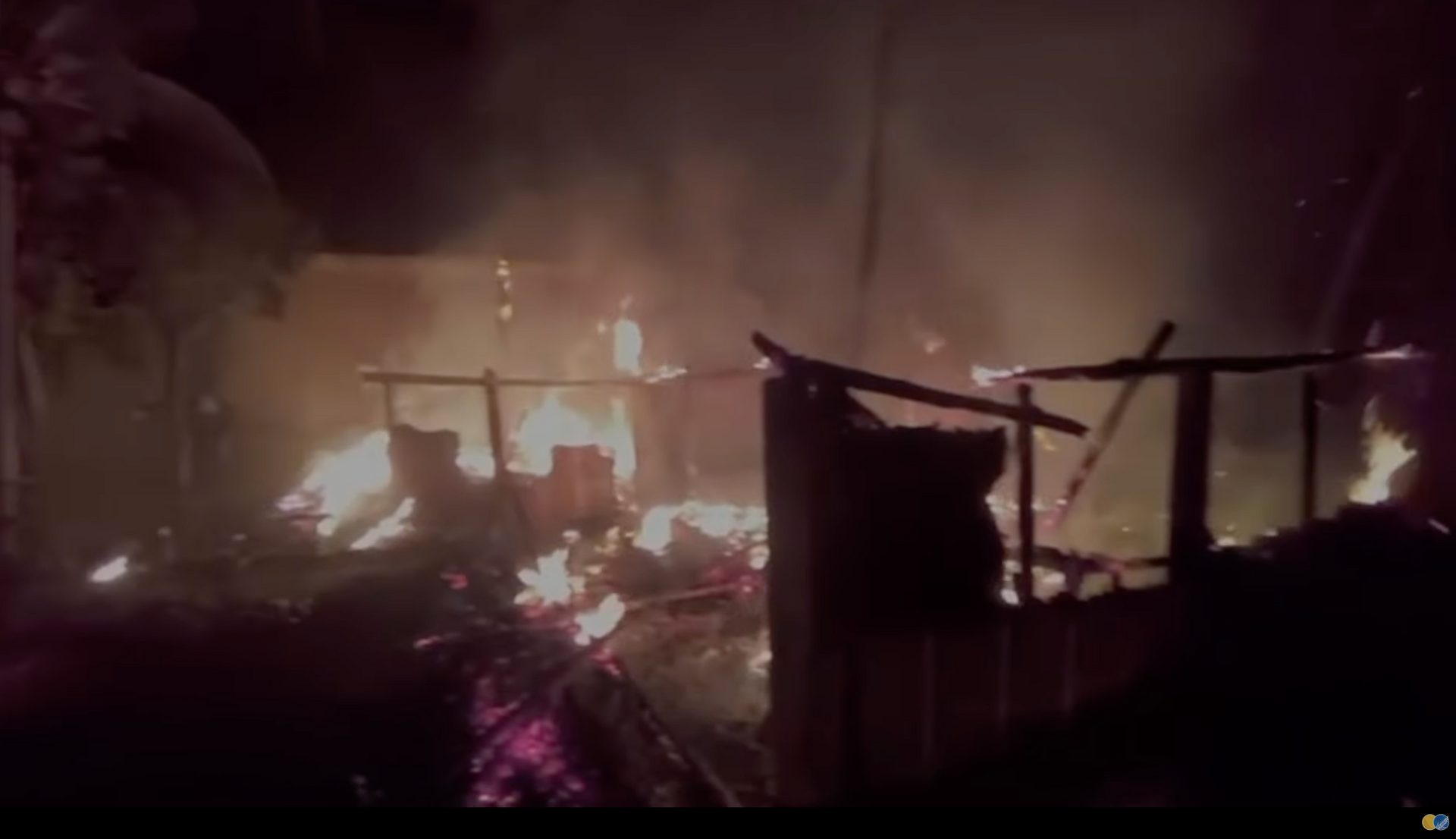Xinjiang - A New Book by Paul Hattaway
Photo: Camels crossing the Kumtag Desert in eastern Xinjiang.
From the Frontlines
"To the angel of the church in Pergamum write: 'These are the words of him who has the sharp, double-edged sword. I know where you live—where Satan has his throne. Yet you remain true to my name. You did not renounce your faith in me, not even in the days of Antipas, my faithful witness, who was put to death in your city—where Satan lives.
Nevertheless, I have a few things against you: There are some among you who hold to the teaching of Balaam, who taught Balak to entice the Israelites to sin so that they ate food sacrificed to idols and committed sexual immorality. Likewise, you also have those who hold to the teaching of the Nicolaitans. Repent therefore! Otherwise, I will soon come to you and will fight against them with the sword of my mouth.'" (Revelation 2:12-16).
It is a great joy and privilege to serve the persecuted Church throughout Asia, and the many invaluable lessons of life and faith we have learnt from them are too many to count. We share one such testimony in this newsletter. However, we must be careful not to go too far by idolizing persecuted believers as though they are on a higher spiritual plane than the rest of us.
The Church in Pergamum was no doubt eager to hear what the risen Lord Jesus had written to them. He started by commending them for their perseverance in suffering, and one of their members had even been martyred for his faith. But in the next breath the Lord gave a solemn warning to them, threatening to come and fight against some of the church members if they would not repent! Being persecuted does not guarantee holiness in our lives. Being washed by the water of the Word and transformed by the Holy Spirit produces holiness and the fruit of the Spirit.
Persecution brings intense pressure to frail people, and they often respond negatively to the pressure. This is the reality of our walk with the Living God. We need Him every moment, and His grace sustains us. Let us be thankful for our brothers and sisters who have endured so much for the kingdom of God, but may we never idolize them by looking to get from them things that can only be obtained as we abide in the glorious presence of the King of Kings.
XINJIANG - China's Gateway to the World -
Book 6 of 'The China Chronicles'
by Paul Hattaway
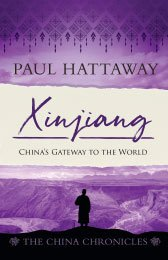
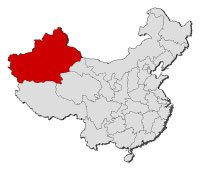
In this newsletter we are pleased to announce the sixth book in our series on the mighty revival that has swept China during the past 50 years. The China Chronicles are proving to be a great encouragement and are enriching the spiritual lives of those who read them.
Xinjiang (pronounced Shin-jeung") is a vast region in northwest China that is twoand- a-half times the size of Texas (or seven times larger than the United Kingdom). It has been much in the news in recent years because of the genocide the Chinese Communist Party has committed there against more than one million Muslim Uyghur people.
Xinjiang also has a long Christian history dating back 1,400 years. Today there are nearly one million believers, mostly among the Han Chinese who have migrated into the region in recent decades. This book focuses on the heroic efforts to reach the Uyghurs and other Muslim groups who remain largely untouched by the Gospel.
The remainder of this newsletter is an excerpt from 'XINJIANG: China's Gateway to the World'. It shares the gripping testimony of Simon Zhao, who went to Xinjiang in 1949, only for the Communists to throw him in prison for 31 years, where he was beaten almost daily. Thinking he had been long forgotten by both God and Christians, the Lord miraculously brought Simon out of prison and gave him a powerful ministry among China's house churches, inspiring them to carry the Gospel to the unreached.
Alternatively, if you send a donation to any Asia Harvest project, please indicate that you would like a complimentary copy of the book and we will gladly send you one.
SIMON ZHAO - A Life Poured out for Jesus
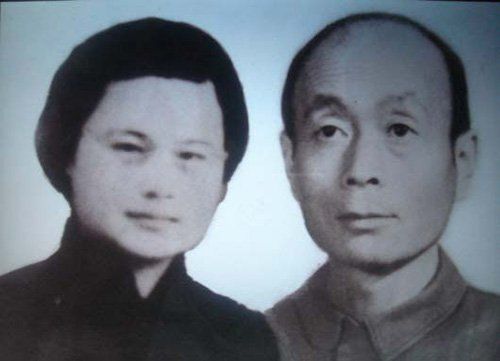
Wen Muling and Simon Zhao—a couple deemed worthy to suffer for the Lord Jesus Christ.
Simon Zhao Haizhen was in his early 30s when he was appointed the leader of evangelism in a Chinese mission group called the Northwest Spiritual Band.
During a prayer meeting, the Holy Spirit gave Simon a vision as he prayed over a map of China. The Lord focused his thoughts on Xinjiang, so he placed his hands over that part of the map and prayed with great fervency.
Later, Simon met other Christians who had also been called by God to take the gospel to Xinjiang and the Muslim regions beyond. Among them was a young woman named Wen Muling, who later became his wife.
Simon Zhao led a team of six Northwest Spiritual Band missionaries to Xinjiang in 1949. They traveled much of the way on foot, though in some remote areas they rode horses or camels. On the way they won many soldiers to faith in Christ, for it was a troubled time in China's history with widespread upheaval.
Eager to plant the gospel in virgin soil, in the winter of 1950 Zhao led his team to a remote oasis town, but the new Communist authorities ordered them to leave. They moved west to Kashgar, where a few days later Zhao was arrested and thrown into prison. His pocket Bible was confiscated, and three long decades passed before he saw another Bible.
Every member of the Northwest Spiritual Band was imprisoned and given extremely harsh sentences, with only Simon Zhao coming out alive. His wife Wen Muling was pregnant with their first child at the time of her arrest, and she suffered a miscarriage. In 1959 she died in the women's prison, but cruelly, Simon wasn't informed about it until 14 years later in 1973.
During his first few weeks and months in the prison labor camp, the guards tried to make Simon renounce his faith, but when that failed, they ordered him to stop praying and beat him every time they caught him doing so. He never stopped praying, but learned to do so in secret when nobody was watching.
After a while, the guards thought Zhao must have changed because they never saw him praying, so they ordered him to write an article for the prison newspaper, praising the transformative power of the Communist system. When they saw what he had written, the guards flew into a rage. His article consisted of a short poem about the beauty of Jesus and a sketch of the cross.
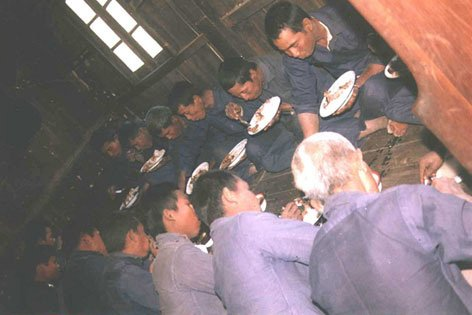
The prison authorities tortured Simon mercilessly, slamming a heavy wooden bench on his back and kicking him all over his body. His sentence was extended for many more years. He was sent to work in a coal mine, where most prisoners died within a few months because of the filthy conditions and back-breaking work. He was required to meet a daily quota of several tons of coal—an impossible task for such a small and frail man. Not only did he have to mine the coal, but he also had to carry it to the surface in a basket tied to his back.
Year after year, the prisoners were forced to work 14 hours a day, seven days a week. The food was meagre and rancid. In the summer there was sweltering heat, and the winter temperatures plummeted to well below freezing. Hundreds of prisoners came to the mine only to perish within a few months. On many occasions, Simon Zhao was so exhausted that he could only crawl on the ground with his load. His body deteriorated, although his mind remained sharp.
For years Simon discreetly witnessed to many of his fellow inmates, and some believed in Jesus. There were a few other Christians in the labor camp, but the authorities placed them in separate cells and work units, allowing them to have only fleeting contact with each other.
Apart from the faithful presence of his Lord, who had promised never to leave or forsake him, Simon felt completely alone. For all the years he remained in confinement, he was not allowed to receive any visitors. His relatives didn't know whether he was dead or alive, and as the years of silence stretched into decades, few people thought about or prayed for him.
Simon Zhao later recalled that during those harsh years, he would periodically look up at the stars and remember the vision God had given him and his co-workers to take the gospel all the way back to Jerusalem. He often prayed, "Lord, I will never be able to go to Jerusalem, but I pray you will raise up a new generation of Chinese believers to fulfil the vision."
After many years of suffering in the coal mine Simon was almost dead, so the authorities transferred him to a chemical factory in another part of Xinjiang. This new job was even worse, for he was exposed to toxic gases and poisonous chemicals. Every evening after work he was required to report to the local prison, where the beatings continued.
Despite the brutal treatment meted out to Zhao, God had not forgotten His servant. On one occasion during a severe winter storm, the guards refused to let Simon stay in the heated cell block, stripping him to his underwear and forcing him to stand outside in the snow. As they pushed him out the door they mockingly said, "You believe in your God, so pray and ask Him to keep you warm!"
For the first few minutes, the cold wind tore into his flesh like a razor. Simon cried out to the Lord for mercy, something amazing happened. He felt a tremendous warmth, so much so that he soon had sweat dripping from his body as if he was relaxing in a sauna! The snow around his feet began to melt from the warmth emanating from his body, and he called out to his cellmates. When they looked out the window, they could scarcely believe their eyes. Steam was rising from his body!
Such dramatic miracles were uncommon, however, and for most of the time he suffered terribly. The Uyghur prisoners were especially cruel to Simon because he was a hated Chinese "pig-eater." He later described the way the Uyghurs beat him as "the same way they surround and pounce on a goat just before they kill it."
On one occasion, Simon was beaten and kicked so severely that his skull was fractured and he fell to the ground. While unconscious, he had a vision in which the Lord spoke lovingly to him: "My child, I am with you. I shall never leave you or forsake you." When he regained consciousness, he touched his head where his skull had been smashed and discovered that the wound had been miraculously healed.
Simon Zhao was beaten for most of the 31 years he spent in prison. It was only during the last several years, when he was an elderly man in his sixties, that he wasn't subjected to physical torture. During those long years behind bars he wrote this short poem:
I want to experience the same pain and suffering of Jesus on the Cross,
The spear in His side, the pain in His heart.
I'd rather feel the pain of shackles on my feet,
Than ride through Egypt in Pharaoh's chariot.
One day, in 1981, the prison superintendent announced: "The government of the People's Republic of China has decided to have mercy on you and show you lenience for the crimes you have committed against our nation. You are free to go."
The man of God shuffled back to his cell dazed and numb. He had never expected this day would come.
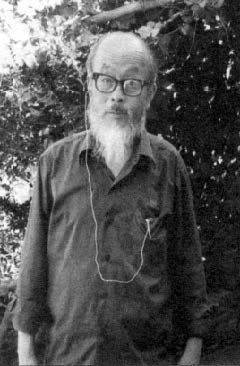
Simon Zhao after his release in 1981.
When Simon was first arrested in 1950 he had been in the prime of his life. He was an energetic man in his early thirties, and his beautiful young wife was expecting their first child. God had called them to preach the Gospel to unreached Muslim groups, and life was rewarding and exciting. Now, 31 years later, he had a long white beard and his wife and baby had died decades earlier.
Zhao walked out the prison gates into a completely different China from the one he had known. He had missed all but the first few months of Mao Zedong's reign, including his death in 1976. He had missed the insanity of the Cultural Revolution from 1966 to 1976, when millions of people were killed by fanatical Red Guards. His body was damaged from decades of torture and back-breaking work, and his face was marked with deep lines from more than three decades in the lion's den.
Nobody was waiting for Simon Zhao outside the prison. Everyone he knew had either died or had long forgotten about him. He had nowhere to go and nobody to see. Penniless, he couldn't even afford to catch a bus into the city.
The prison labor camp had been a part of his life for so long that he decided to construct a makeshift hut just outside the entrance. As he lay in his damp, cold hut, his mind sometimes wandered back to his life as a young man and the call God had given him. He had tried to obey God, but it hadn't worked out. He hoped he would soon die, for he knew that heaven was a much better place, where all the pain would be removed forever.
After some time, Christians in Kashgar learned about Simon Zhao and his testimony. With deep respect they brought the old saint food and a Bible, and they helped him in various ways.
News of Simon's remarkable survival spread from church to church in Xinjiang, and soon stories about him were carried back to other parts of China.
A house church leader from Henan Province traveled to Xinjiang to meet him, and persuaded him to make the long journey to Henan to share his vision for unreached people groups with a new generation of Christians. One senior house church leader shared the impact Simon Zhao had on his church members:
"I remember Simon Zhao as a most respectful older brother. He was a great soldier for Christ—one of the greatest Chinese Christians. He was a tremendous Bible teacher, able to wisely handle the Word of God. The Holy Spirit always spoke to people's hearts through his ministry. Until that time, mission work had not been a major priority in our churches. We were busy winning people to Christ, but the Lord began to show us that we also needed to lift up our eyes and expand our vision beyond China's borders, especially to the countries bound by Islam, Buddhism, and Hinduism.
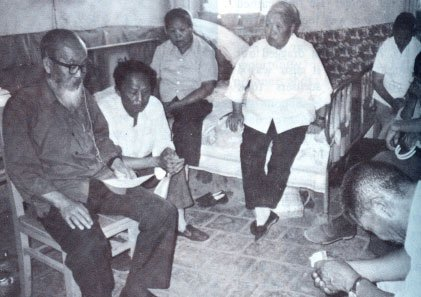
Simon Zhao sharing at a home fellowship in the late 1980s.
Our church members loved Uncle Simon like their own father, and felt very close to him. He had been deprived of fellowship with other believers for decades, but now the Lord gave him spiritual sons and daughters who deeply respected him. Sisters in the church cooked for him, washed his clothes, and helped him however they could. They treated him as they would an angel of God.
At that time we published a magazine to encourage believers. Simon refused to write any articles or share his testimony, saying, 'I don't want to have any attention focused on me.'
His ministry was very powerful, and a fire was lit in the heart of everyone who heard him. Many tears flowed, and thousands of believers were touched and received a call to missionary work."
Simon Zhao finally went to be with the Lord on December 7, 2001, among Christians who loved him. He was 83-years-old.
Since that time, the Chinese house church networks have sent thousands of missionaries into the unreached nations surrounding China.
"Uncle Simon," as he came to be affectionately known, had learned that the Lord always finishes what He starts, and is faithful to fulfil all of His promises.
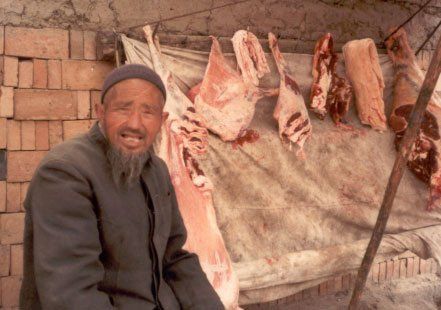
E-Newsletter Sign Up
RECENT POSTS
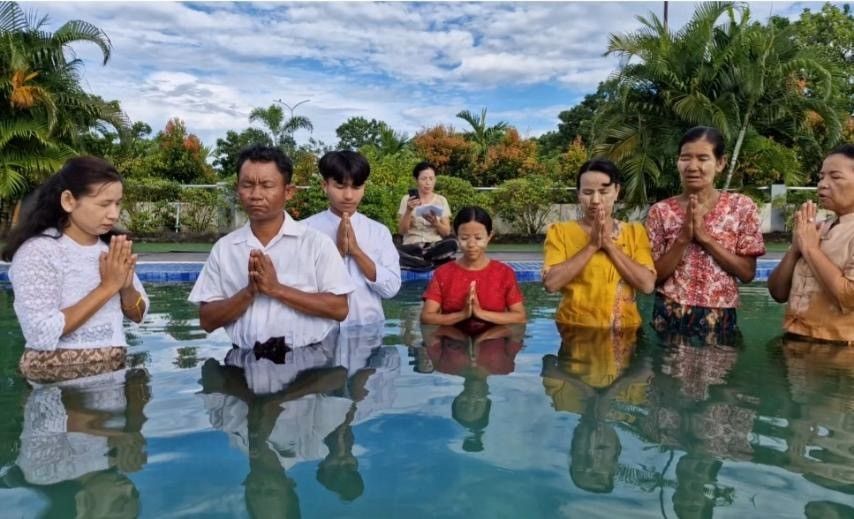
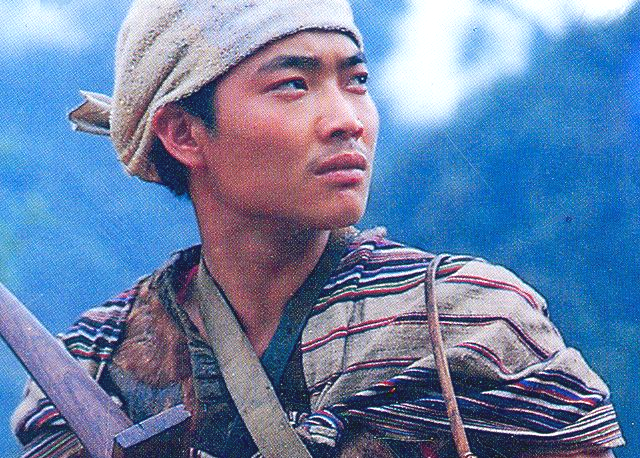
"Feel free to share this message with interested Christians or on social media" - Asia Harvest


